Why Is Child Development Important?
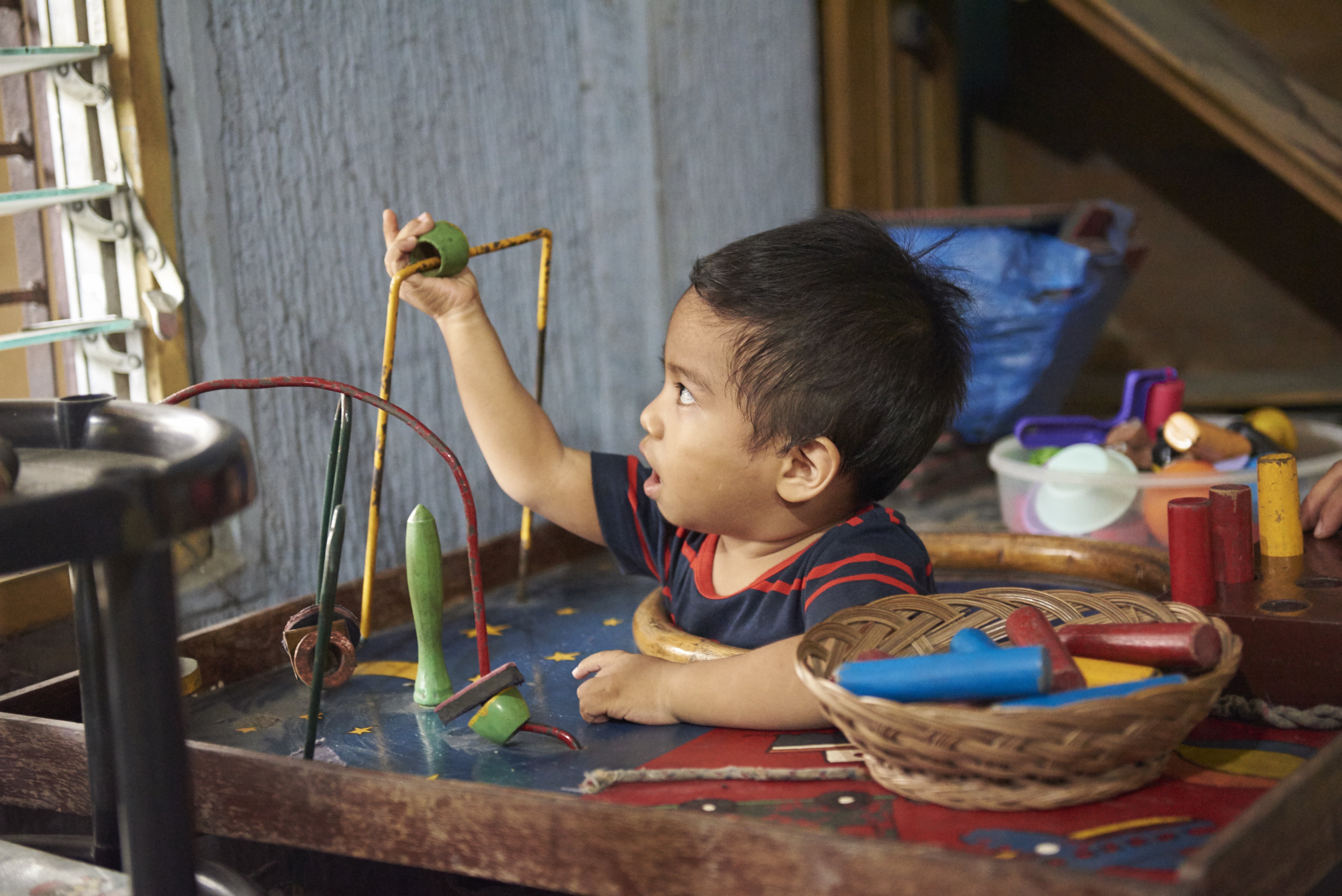
Share this step
The period of early childhood development is arguably the most important period of life. In order to reach their full potential, children need appropriate support from families, education and healthcare professionals during this period.
The importance of child development
The first three years after birth are one of rapid growth and development, as a child’s brain creates complex neural pathways at an unprecedented speed.1 By age six, the brain has developed to 90% of its adult size,2 as children continue to absorb a staggering amount of information from their experiences and environment. These early experiences, both good and bad, lay the foundation for a child’s future survival, growth, health and wellbeing.3,4 Research has consistently shown that good early childhood development will have a direct positive impact on a child’s long-term health outcomes and will improve future opportunities, school attainment and even earning potential.5 Particularly important is the impact of this period on a child’s emotional and social development, which is vital for their future confidence, communication, relationships, community inclusion and mental health.
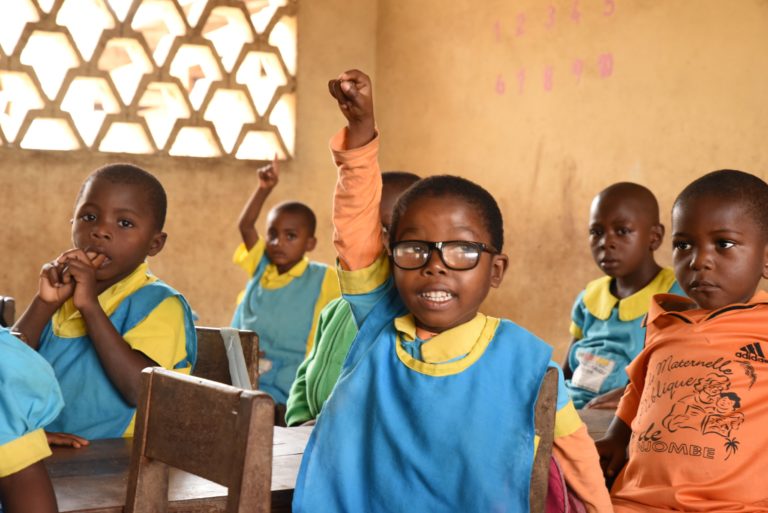 © CBM
© CBM
Early childhood development is a period of great opportunity, but also one of great vulnerability. Many children cannot realise their full potential because of adverse conditions in their environment. For example, evidence from Pakistan showed that children who receive little sensory stimulation in their rural homes are vulnerable to stunting, low-weight and decreased psychomotor development.6 Factors like inadequate nutrition, environmental toxins, unstable caregiving, limited stimulation and stress can all negatively impact on a child’s development. Children living in poverty and fragile living conditions, such as war or displacement, are particularly vulnerable to inadequate development.3,7 These adverse childhood experiences may also cluster and be compounded over time. For instance, a child living in poverty is more likely to experience stress, malnutrition and unstable caregiving, all of which negatively impact on child development.
Adverse effects to child development in the first years of life can have life-long consequences and can negatively impact on school readiness and learning potential, mental and physical health as an adult, resilience to stress and resolving conflict, as well as depleted family resources and inter-generational poverty.8 However, recovery is possible with appropriate intervention and support. Investment in child development policies and programmes will result in long-term returns, as children with adequate support in their early years are healthier, better educated and more likely to contribute to society and the global economy.5
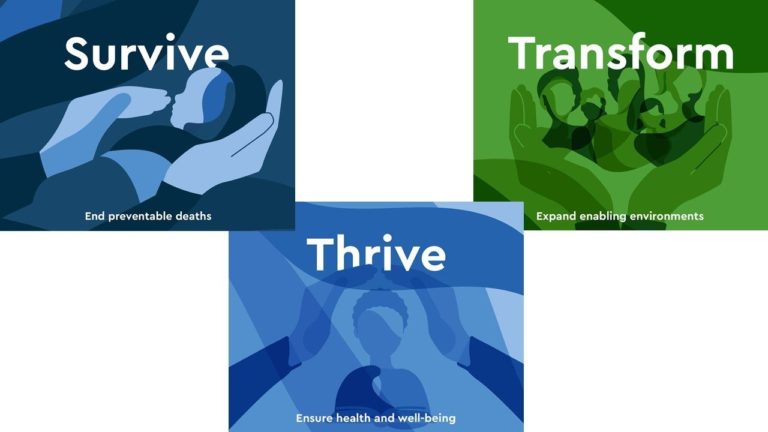
© World Health Organisation9
Survive, Thrive, Transform
The global child health sector recognises the importance of early child development, and has shifted its focus to highlight that it is no longer enough for a child to simply survive, children have the right to thrive. When children are supported to thrive, we can see long-term, transformational change across our global society, as they are better educated, less poor and so on.10
“Commitment to early childhood development can be the catalyst to enable children to thrive, and thereby transform health and human potential” – World Health Organisation: Survive, Thrive, Transform10
Additionally, the United Nations Convention on the Rights of the Child (1989), and most national laws, emphasise that all children have the right to live in a secure, loving environment, free from harm, abuse and discrimination. Children have the right to the healthcare, nutrition and education required to reach their full potential. Parents, family members, communities, governments and healthcare providers need to work together to fulfil these rights.
How do we support healthy child development?
A critical factor in child development is that children receive nurturing care. Nurturing care ensures a child’s environment is focussed on their needs, health, nutrition, safety, emotional support and social interaction.4 Simply put, “Nurturing care is what the infant’s brain expects and depends upon for healthy development”.11
Children grow and develop best when parents give a child affection, attention and stimulation. The World Health Organisation’s Nurturing Care Framework11 asks that parents monitor and promote child development by focusing on five key areas:
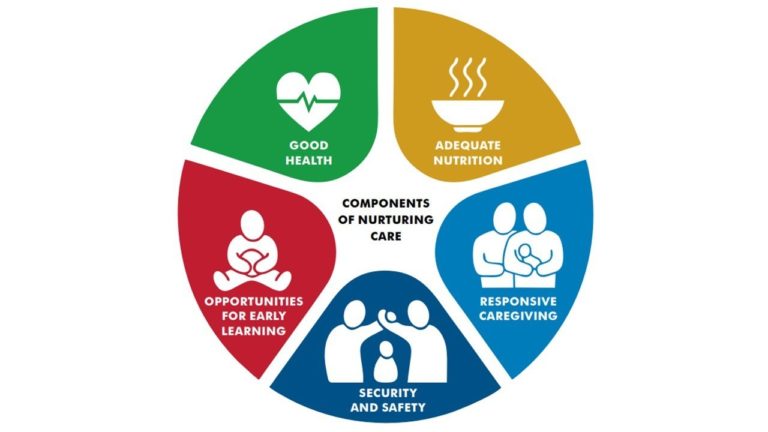 WHO: Components of Nurturing Care. © World Health Organisation
WHO: Components of Nurturing Care. © World Health Organisation
1. Good Health: Parents should encourage good health by protecting the child from household and environmental danger, adopting good hygiene practices, and using promotive, preventive and curative healthcare services. Parents should also protect the child’s emotional state by responding affectionately and appropriately to their child’s needs.
2. Adequate Nutrition: Essential micronutrients are needed for a child’s brain and body to develop, both during a mother’s pregnancy and in the early period after birth. Essential nutrients may include proteins and fats to help the body grow and vitamin A to build the child’s immune system.
3. Responsive Caregiving: Observation and response to a child’s physical, psychological and emotional needs is important for a child’s health, learning and social relationships.
4. Security and Safety: Young children are incredibly vulnerable to numerous threats within their environment. Children who are not made to feel safe and secure by a parent can withdraw socially and act fearful of adults and other children.
5. Opportunities for Early Learning: Learning begins from birth, not just when a child starts to attend nursery, pre-school or school. This early learning will help a child develop motor coordination, social competence, resilience, creativity and learning potential. Opportunities for early learning are promoted through play, communication and stimulation from other children and adults.
Although often considered a frivolous activity, play is an integral component of a child’s development. Simply put, play is learning. Play can involve all of a child’s senses (sight, hearing, smell, touch, taste), and through play, children develop a number of skills, including problem-solving, creativity, expression of emotions and socialisation. Importantly, play helps a child develop self-confidence and self-worth, by strengthening attachment with parents and caregivers.
Healthcare professionals, education and other social care providers should help parents in the process of nurturing care and guide them in play across a diverse selection activities, including role play, dancing, singing and drawing. A variety of stimuli is important to engage a child and provide them the opportunity to learn different skills.
Share this
Integrated Healthcare for Children with Developmental Disabilities
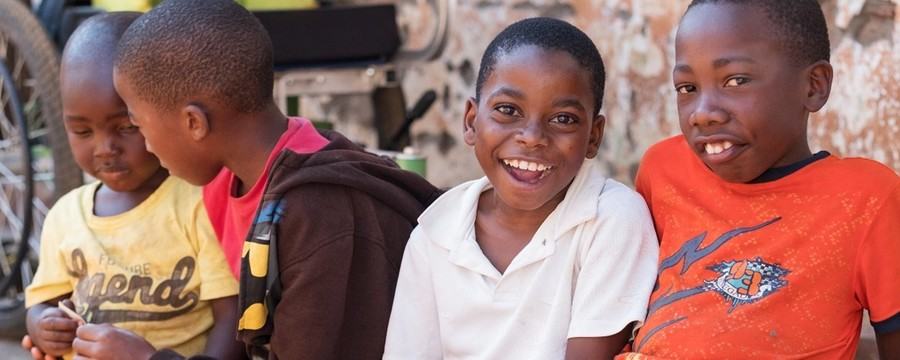
Integrated Healthcare for Children with Developmental Disabilities


Reach your personal and professional goals
Unlock access to hundreds of expert online courses and degrees from top universities and educators to gain accredited qualifications and professional CV-building certificates.
Join over 18 million learners to launch, switch or build upon your career, all at your own pace, across a wide range of topic areas.
Register to receive updates
-
Create an account to receive our newsletter, course recommendations and promotions.
Register for free







